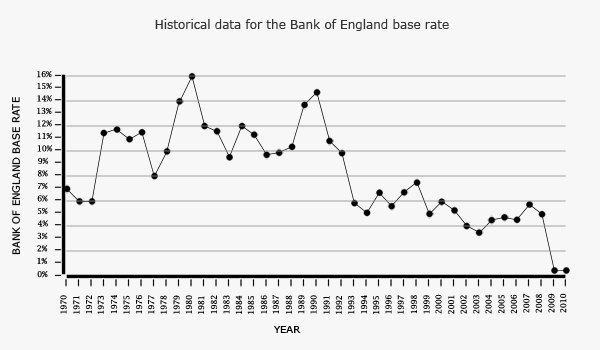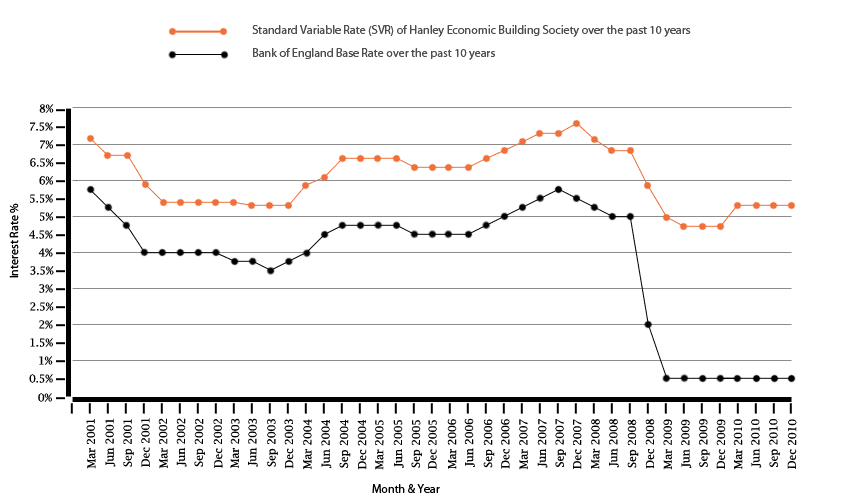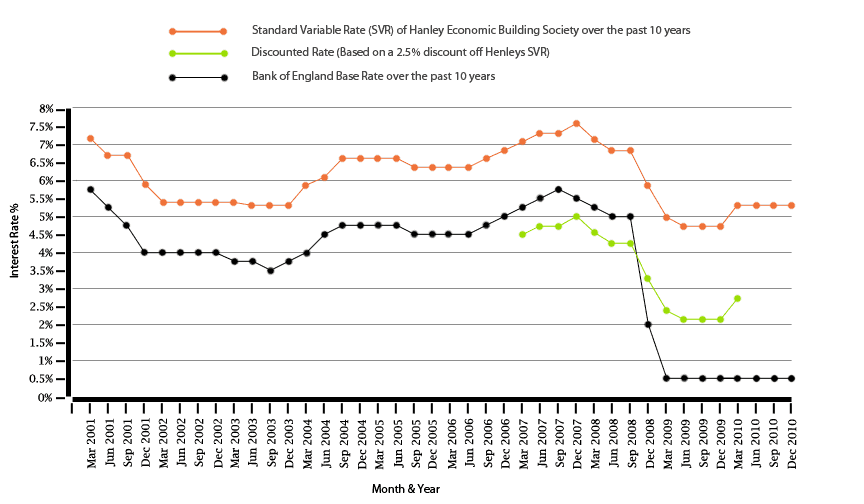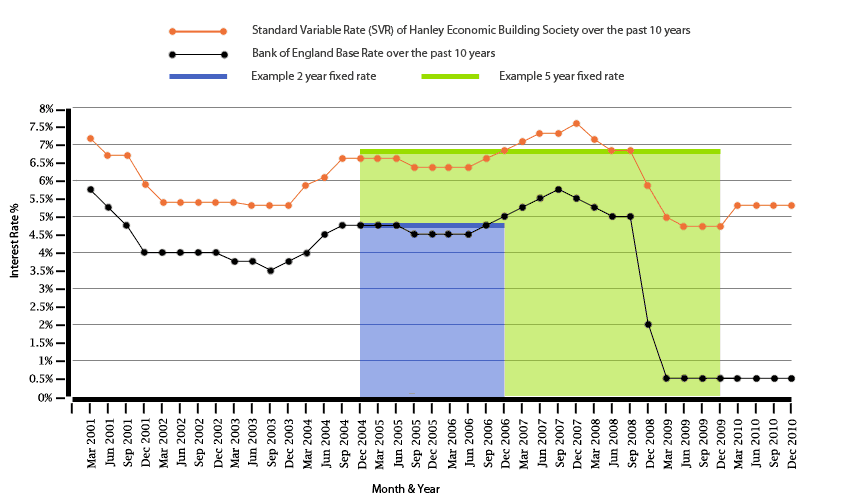Keystone IMC Mortgage Section About interest rates and interest schemes - Bank of England, SVR, Discounted, Trackers & Fixed Rates
About mortgage interest rates. SVR | Trackers | Discounted | Fixed mortgage rates
Mortgage schemes explained
Here comes the tricky bit. We often find that explaining the different types of interest schemes available takes the most amount of time and for good reason because there is quite a bit to understand. However by chatting to one of our expert advisors and following this guide it won't be long before you start to understand this part of the mortgage with enough knowledge to make an informed choice of what is best for you.
We'll start off by looking at the Bank of England Base Rate and the bank or building society's standard variable rate (SVR)
What is the Bank of England Base Rate?

The Bank of England Base Rate is not a mortgage product like a fixed rate or base rate tracker which we'll cover shortly but they do have a big influence on mortgage rates so you should understand its function.
This is a snap shot of what the rate was at the Bank of England in August for each of the past 40 years. Interest rates are set by the Bank of England Monetary Policy Committee (MPC) who meets every month (usually the first Thursday in the month) and decides whether to increase, hold, or decrease the base rate. The MPC is made up of 9 members and they vote for their preference. The influencing factor is enabling inflation targets to be met but these interest rate adjustments effect mortgage rates so it is worth being aware of the Bank of England and what it does.
Some mortgages are directly linked to the Bank of England Base Rate, for example a base rate tracker. Lenders standard variable rates (SVR) are also indirectly linked to the base rate. If you have a fixed rate then you will not be affected by the Bank of England base rate changes during your fixed rate period.
What is the Lender's Standard Variable Rate (SVR)?

The lenders standard variable rate, SVR for short, is the rate that your mortgage will revert to after any initial deal period ends. In the past the SVR was a stand alone product that you could freely take out even with just a 5% deposit. There was usually no arrangement fee and no charges for early repayment. However that has changed in recent times. As the Bank of England base rate started to drop in 2008, so did banks and building societies SVR's. This was in part due to some lenders contractual obligations of their SVR not exceeding a certain margin above the Bank of England Base Rate (for example 'we guarantee the SVR will never be more than 2% above the Bank of England Base Rate'). The lenders that didn't have these contractual obligations dropped their SVR's but not by anywhere near the same margin simply because they didn't have to. At the same time fixed, capped, discounted and tracker rates did NOT drop by the same margins and so we were left with a situation where by for the first time the SVR is actually lower than the incentive deals on offer. What's more, they didn't have an arrangement fee and usually didn't have an early redemption penalty. It was no surprise then when all lenders stopped offering the SVR as a stand alone product.
The SVR is still of real importance however. Imagine you are presented with two offers from two different lenders, lets call them (A) and (B). Both lenders are offering you very similar deals with the same rate, set up fee, early repayment charges etc. The only difference is that (A) has an SVR of 2.5% and (B) has an SVR of 6%. In this case we would advise that you choose (A) because if their SVR is lower than (B) now, then there's a good chance it will still be lower when your initial deal expires.
Can a lender have more than one SVR?
Yes. Some lenders have relaunched their SVR for new customers whilst leaving existing customers with their original SVR. This has been done because many existing borrowers have, like mentioned above, SVR's that are guaranteed to be no more than a small margin above Bank of England Base Rate. Many but not all lenders have now introduced new SVR's (of course they are higher) for new customers.
What is a Discounted Rate?

When we talk about discounted rates we are referring to rates of interest that are discounted from the lender's SVR (Standard Variable Rate). Due to the SVR being a variable rate the rate you pay is also variable.
The discount is usually for a set period, say 2 years, following which the discount stops and you revert to that lender's SVR. A discounted rate of interest offers a true reduction off the lender's Standard Variable Rate that does not have to be repaid later on. Any increases or decreases in the SVR will impact on the rate of interest applied to your mortgage and therefore the monthly payment.
You can expect to find the majority of discounted rates on offer today to have arrangement fees for set up and early repayment charges for early redemption.
good for..
- offers a real discount on the lender's SVR
- benefits from rate reductions when lender reduces their SVR
- usually a lower initial rate of interest than that of a comparable fixed rate
but..
- has redemption penalties and usually an arrangement fee
- budgeting may be difficult
- will return to a higher variable rate when discounted period ends
- rate increases will still apply
- lenders may not always reduce their SVR in line with the Bank of England Base Rate
What is a Base Rate Tracker (BRT)?
Like discounted rates, the rate on a base rate tracker (BRT for short) will vary. On the face of it discounted rates and BRT's are very similar. In fact when compared side by side there are many similarities, the rate, the set up fees and the early repayment charges, however there is one big difference between the two. Unlike a discounted rate a BRT is linked not to the lenders SVR but directly to the Bank of England. The rate you pay will be a margin above or below whatever the Bank of England Base Rate is currently. This can be advantageous if The Bank of England reduces it base rate and the lender doesn't follow suit (see graph above) In this instance if you were on a discounted rate you would not benefit from the Bank of England Base Rate reduction but if you were on a BRT you would.
good for..
- guaranteed to track the Bank of England Base Rate
- benefits from rate reductions when the Bank of England Base Rate is reduced
- usually a lower initial rate of interest than that of a comparable fixed rate
but..
- has redemption penalties and usually an arrangement fee
- budgeting may be difficult
- may return to a higher variable rate when the tracker period ends
- rate increases will still apply
What is a Fixed Rate?

A fixed rate of interest will guarantee that even when interest rates at the Bank of England or the lenders SVR are on the move your rate will stay the same. Fixed rates are therefore very popular with people who like to budget and know exactly what their repayments will be over a given period. Typically interest can be fixed for 1, 2, 3, 4, 5 years and sometimes longer however the most popular choice seems to be 2 and 5 year fixed rates. The trade off here is that the cost of knowing your monthly payment for a given timescale is that the rate you fix it at will almost certainly be higher than that of a discounted rate or a base rate tracker.
good for..
- offers easy budgeting - exact cost known
- offers protection against rate increases during the fixed rate period
but..
- has redemption penalties and usually an arrangement fee
- offers no benefit from rate reductions during the fixed rate period
- potential payment shock when fixed rate expires
Get in quick
Unlike the Bank of England Base Rate that's reviewed at the beginning of each month, the rates the lenders offer (fixed, trackers, discounts etc) are often withdrawn without notice and replaced with rates that can be higher or lower. For example the Bank of England Base Rate may not change for many months but during the same period lenders will withdraw, reprice and relaunch many times over the same period. Lenders will often do this to control the levels of business they wish to receive.
For mortgage advice we can charge a fee of typically £295 or we can receive commission from the lender
- Arrangement Fee
- Can also be referred to as a booking fee or reservation fee. The arrangement fee is a fee the lender charges for setting up the mortgage. The fee can often be added to the mortgage instead of being paid on application.
- Early Repayment Charge (ERC)
- An Early Repayment Charge is a penalty that the lender will charge when a borrower has broken the terms of the original mortgage agreement within the penalty period such as before a fixed rate has expired.
Usually this will be for the following reasons.
- The borrower wishes to change their mortgage product before their current one has finished
- The borrower wishes to repay the mortgage early - usually due to the sale of the property
- The borrower wishes to borrow more money, their existing lender cannot help and therefore needs to change lenders in order to borrow the extra funds
The penalty you will pay for repaying this mortgage before 1st october 2016 is 3% of the original amount borrowed. This means the maximum you could pay based on your loan amount of £200,000 is £6,000. - Interest
- Interest is the charge made by the mortgagee (bank or building society) for lending the borrower the funds they require to purchase a property.
